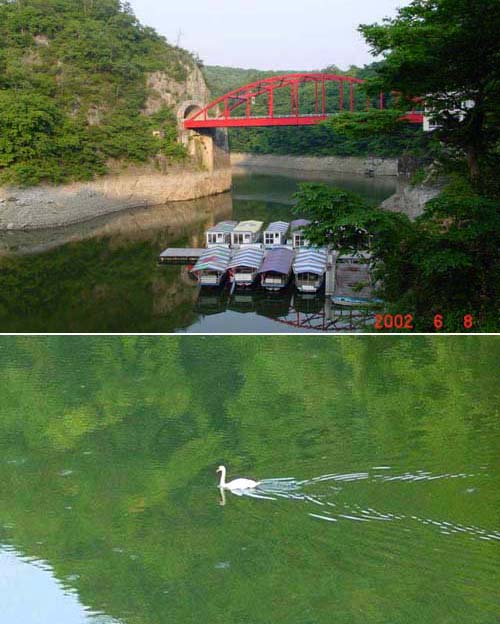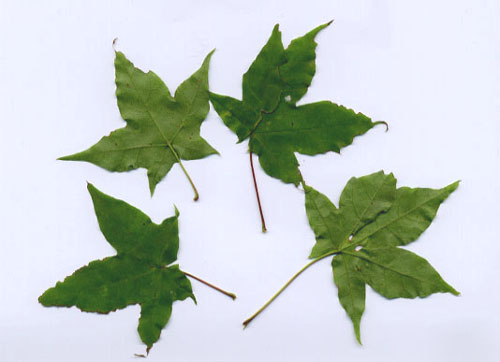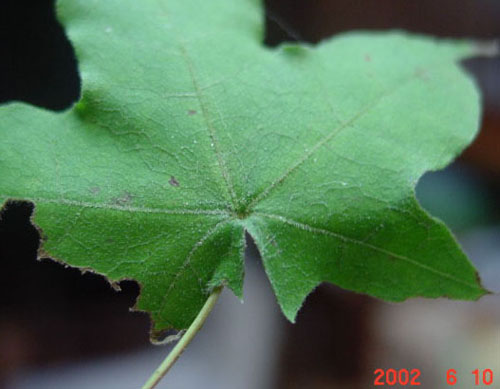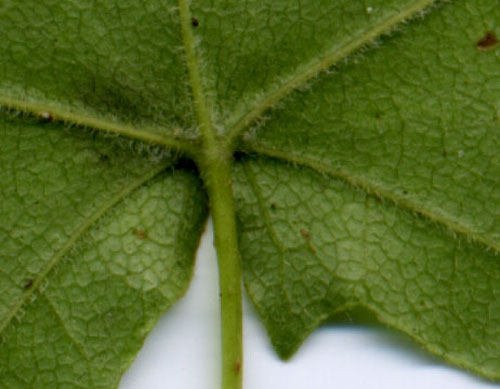
In June, 2002 I went to Taishaku Valley Hiroshima Prefecture.
It was
cloudy. I borrowed rent-a-car at JR Fukuyama station, took Route 182 and
went north.
Through Yuki town, I went to Tojo and turned left in the direction
of Taishaku Valley there.
It is a 2 hour drive from the Fukuyama station.
It was for investigation of Taishakuitaya an endemic species of this region.
Taishaku Valley is a large ravine covering about 20km of north and south,
Tojo Hiba district, Kamiishi Kamiishi district, and Yuki Kamiishi district.
It is one of the most famous 5 Valleys in Japan, and is specified as the
quasi-national park.
Taishaku river eroded the karst plateau away and built
up this ravine.
It seems to be the famous place for maple viewing in autumn.
The swan was seen on the water surface of Lake Jinryu which was built by damming up Taishaku river.

Since nothing was prepared for investigation of Taishakuitaya,
it was
very difficult for us to find them out.
We found Ohmomiji (Acer amoenum),
Oniitaya (A. pictum var. ambiguum),
Mitsudekaede (A. cissifolium)
immediately.
But to tell the truth, as for Taishakuitaya,
classification
knowledge of Itayakaede (Acer pictum)
was my only reliance,
that
is, the only information was
that Taishakuitaya look like Enkokaede (A.
pictum var. marmoratum)
and having hairs on the both sides of a leaf.
So we could not discover them easily.
At the time when I had almost given up finding it out,
we at last found
it out something like the species near the entrance road
to the tourist
ship stop of the upper photograph.
There were rocks perpendicular to the
ground and were wire nets for the prevention of falling-stones.
I obtained
several leaves of the tree through the wire net,
and when I checked them
I could ascertain that it was the very thing I had been looking for.
Scientific name of Taishakukaede is "Aecr pictum Thunb.ex
Murray subsp.taishakuense (Ogata) Ohashi."
What this scientific
name means would be understood
that it belongs to genus Acer and
species name is pictum,
which was named by Mr.Thunberg & Mr.
Murray and the subspecies name is taishakuense,
and that Mr. Ohashi
arranged and re-named this species respecting the flow of Mr. Ogata's classification.
Needless to say,
Aecr means genus of maple and pictum means the general term of species of painted maple.
This general term was
called mono before.
Name of taishakuense is the formal scientific
name of Taishakuitaya
and it has the meaning "habitat is from Taishaku
area."
The feature of Taishakuitaya is "small or middle tree,
small and
not so large leaves, deeply cut lobes", so resembles Enkokaede.
Furthermore,
it is the point of distinction that it has hairs both the upper and the
lower surfaces of the leaves.

Next, I will show you the characteristic figure "it is hairy along
the main veins also on the upper surface".
By the good choice of the
light angle photograph can express them with reality.
The hair on the main
veins are accepted in the following photograph.
In this leaf, fine hair
was observed on the whole upper surface.

The feature of Taishakuitaya: Hairy along the main veins also on the upper
surface
In this connection, let me show you the photograph of the lower surface.
Hairs of main veins are checked from the following photograph.
